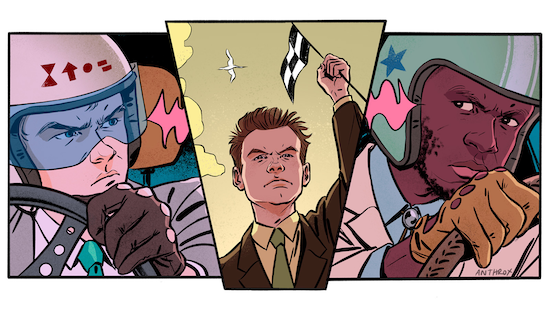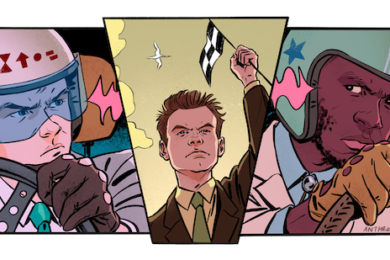“The old world is dying, and the new world struggles to be born: now is the time of monsters.” As one of the many iterations of this idea exclaims, once again we are bridging the obsolete and the not yet. Situated somewhere between an end-of-days neoliberal dystopia and some uncharted post-scarcity digital utopia, we enter a suspended state of post-normalcy and (environ)mental global weirding. Hopeless civilisational monsters need no further introduction. But a different monster trapped in liminal space starts making noise to fill the void, becoming hopeful it can build the bridge to a new time.
The hypothesis of the ‘hopeful monster’ comes from the marginalised evolutionary biologist Richard Goldschmidt, who posited change in macromutational leaps as a driving force of evolution, in contrast to the microevolutionary gradualism of neo-Darwinians. Instead of evolution’s dustbin, a uniquely monstrous organism possessing a radical mutation can give rise to a distinct species within just one generation. It’s a risk – so the monster is as much anxious as hopeful – but if it succeeds, evolution accelerates.
The Russian semiotician Yuti Lotman charts similar dynamics in cultural systems, where linear, gradual development is interspersed with rare moments of explosion, characteristic of big ideas, breakthroughs, and clashing moments of extra cultural space (regarded as chaos, though organised) breaking into the bubble of culture and driving radical change.
Whether your perspective sees the hopeless monsters of late capitalism driving civilisational collapse, or hopeful ones bringing about a radically diversified post-humanist enlargement of cultural space, change, at least, is imminent.
At the intersection of biology and culture, where music reigns, survival of the weirdest is not guaranteed, but radical mutations can drive cultural evolution in bold, exciting leaps of novelty. Perhaps music – as the most essential of the arts, the most intimately tied to our bio-spiritual life – best transmits and downloads those cultural mutations into our intimate systems.
When this hot, hermetic noise coming from four young men from London, relishing in their esotericism and seemingly indifferent to being understood, playfully stepped onto the scene, an explosive buzz followed. Black Midi’s superlative musicianship, brimming with fresh ideas, kept it firmly real.
Black Midi’s onomatopoeic sound draws omnivorously from all sources: the mechanical roar of civilisation, the animal world, hidden corners of the psyche, and the digital ‘infernal din’ – all monstrously driven forward by jarringly thrilling macromutations of sound and explosive juxtapositions. Named after a Japanese music genre involving the layering of digital MIDI files with proliferating kajillions of notes crammed on top of each other to the point of blackening the score sheet, Black Midi themselves seem to do the same with genres, exciting an epic referencemania. In a hyper-informed world there is no more originality, only creativity.
A fast-evolving entity in a heightened state of impressionability, the band’s adventurous dialogue with contemporary music history appears as a form of radically open cultural information processing, excavating future-propelling ideas without a trace of nostalgic reaction. In a classic rip-it-up-and-start-again wipe-out, levelling up to every new musical threshold leads to a new ground zero. Such a blackening of the cultural score reminds me of a statement by Kim Gordon explaining the concept behind her song ‘Murdered Out’: “When I moved back to LA I noticed more and more cars painted with black matte spray, tinted windows, blackened logos, and black wheels,” she wrote back in 2016. As the ‘black-on-black’ look crept out of LA car culture into the mainstream, Gordon saw in it “the ultimate expression in digging out, getting rid of, purging the soul. Like a black hole, the supreme inward look, a culture collapsing in on itself.”
First contact with Black Midi’s energy feels like a scintillating purge, throwing civilisational debris back at its own face, like just such a black hole sun exploding. Their glorious hellfire noise will wipe you inside-out until you are left with nothing else to feel but pure love, digging through layers for something long lost to remind you why you fell in love with music in the first place. Building complex structures only to better demolish them, their boys’ noise bridges over the abyss of violence and banality, deconstructing the tropes of masculinity until they are stripped off toxicity to their rawest core. The institutions of the ego are meticulously crushed.
The Windmill/Speedy Wunderground phenomenon is real. To borrow the anthropologist Margaret Mead’s warning against ever doubting the force of a small group of thoughtful, organised, committed people – yes, it’s the only way to change the world. The friendly cross-pollination of London scenes, coupled with a creative bit of crisis management for the absence of second guitarist Matt Kwasniewski-Kelvin (on short-term mental health hiatus) has led to the band augmenting their sound. The additional instrumentation pushes the sound vertically to swaying operatic heights, rarely seen in anything tagged ‘punk’.
David Lynch likened creative ideas to fishing – you wait and when they start biting, it’s showtime. Keep in the shallow waters and you’ll catch the small ones. But “down deep, the fish are more powerful and more pure. They’re huge and abstract. And they’re very beautiful.” Creatively sincere, their instincts radically open, Black Midi pack a bucketful of pretty big catches on Cavalcade. The concept revolves around a series of third person narratives where each tells their oddly allegorical story in a procession. Each track is a universe of its own, doing what art should do: using its own virtual space as an experimental testing ground to try those limits of taboo and impossibility that remain limited IRL.
Combining raw art and subversive entertainment values, Black Midi are one of the most ferociously boundary-pushing musical entities we have now. The group drive rifts through the pop cultural system, in an epic drama of creative genius struggling to survive in a culture hellbent on editing it out. Who better than BRIT school enfant terribles to bring transgressive musicality to popular sonic discourse? Their larger than life messthetics take vigilante action to save formal innovation from elite appropriation and unsanitised expression from snobbish asphyxiation. Few artists better capture the feeling of our age. The monster’s hope is fulfilled. Cavalcade may prove to be one of the most accomplished albums of 2021; future classic of a happily undefined now-core genre. Humanity, level up. If they are giving us any taste of the immediate future, let the roaring twenties roll.



